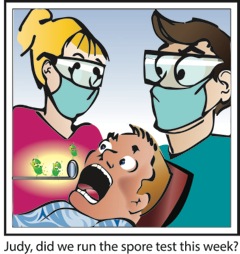Dental employers have a legal obligation to provide a safe workplace. Under requirements enforced by…

Celebrating World Hand Hygiene Day
On May 5th every year, the World Health Organization (WHO) celebrates World Hand Hygiene Day! Each year the SAVE LIVES: Clean Your Hands campaign aims to progress the goal of maintaining a global profile on the importance of hand hygiene in healthcare and to bring people together in support of hand hygiene improvement.
2024 World Hand Hygiene Day Slogan:
Why is sharing knowledge about hand hygiene still so important?
Because it helps stop the spread of harmful germs in healthcare.
Proper hand hygiene is considered to be the single most important measure for preventing healthcare-associated infections (HAIs). The US Centers for Disease Control and Prevention (CDC) estimates that each year nearly 2 million patients in the US acquire an infection from just being in the hospital, and that almost half of these patients die as a result of their infection. All healthcare workers should clean their hands at the right time and in the right way to help prevent HAIs. Evidence indicates that noncompliance with hand hygiene practices contributes to HAIs and the spread of multi-resistant microorganisms.
In Dentistry…
 In dentistry, OSHA and most state dental boards have hand hygiene requirements. OSHA requires employees to immediately wash hands after removal of gloves and/or following contact with blood or other potentially infectious material (OPIM). State dental boards require adherence to CDC recommendations, which call for hand hygiene before and after each patient. Soap and water should be used when hands are visibly dirty. CDC also promotes the use of 65-90% alcohol-based hand rubs with moisturizer for routine use as an alternative to soap and water, so long as hands are not visibly dirty or contaminated.
In dentistry, OSHA and most state dental boards have hand hygiene requirements. OSHA requires employees to immediately wash hands after removal of gloves and/or following contact with blood or other potentially infectious material (OPIM). State dental boards require adherence to CDC recommendations, which call for hand hygiene before and after each patient. Soap and water should be used when hands are visibly dirty. CDC also promotes the use of 65-90% alcohol-based hand rubs with moisturizer for routine use as an alternative to soap and water, so long as hands are not visibly dirty or contaminated.
OSHA Review, Inc. a registered continuing education provider in the State of California, specializing in Dental Practice Act, infection control, and Cal/OSHA training. OSHA Review subscribers in California receive updated regulatory compliance and infection control training thorough our bi-monthly newsletter.

